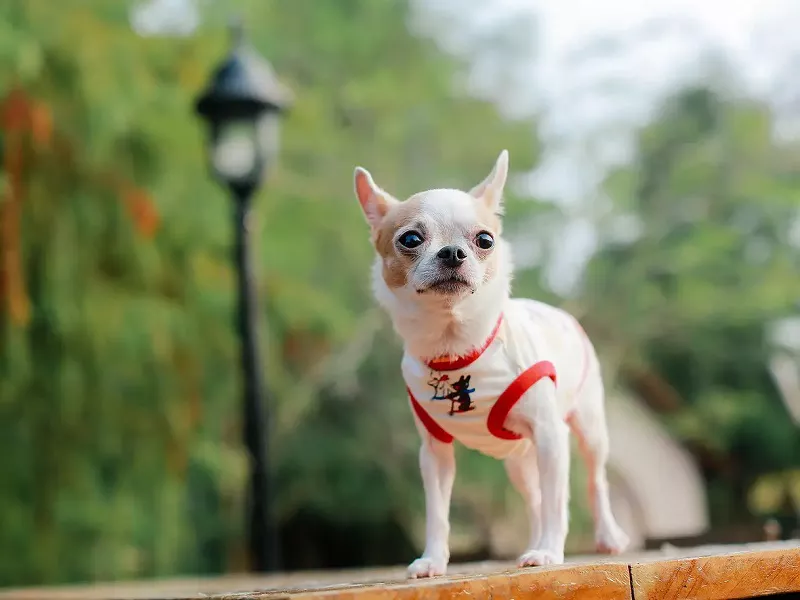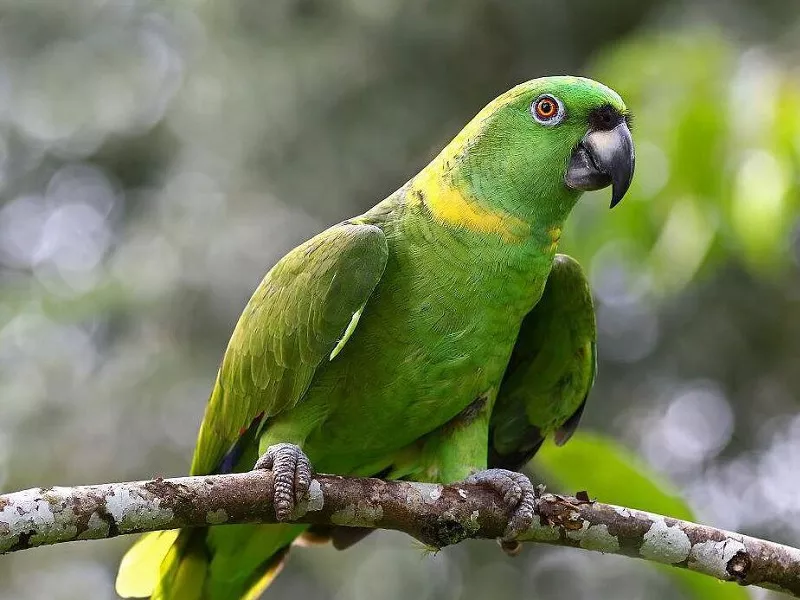Chihuahuas are small dogs, lively and lovely, full of exercise, like to be cared for, and a little jealous. The growth of each dog can be divided into puppies and adult dogs globally, and can be subdivided into several at these two stages, such as small puppies who cannot take care of themselves, pregnant bitches, elderly dogs, etc., Chihuahuas each Each stage requires different nutrients. Therefore, pay attention to the nutritional needs of the chihuahua at each stage to prepare a suitable diet for the Chihuahua, and the Chihuahua will grow up healthily.
For puppies who have just entered the new environment, the breeder should understand the type, amount and feeding time of the original owner’s food, and try to keep the same as the original owner as much as possible. Slowly adjust your dog’s diet. Otherwise, if you change the dog’s eating habits, change the dog’s original living environment, or a series of rapid changes such as long-distance transportation at the same time, the puppy‘s physical function will have a strong stress response, causing the puppy Decreased resistance, gastrointestinal disorders, and endocrine system disorders, can easily cause dog diseases at this time.
For puppies and dogs, you should eat some soft food, such as soft foamed dog food. The gastrointestinal tract of dogs is different from that of humans, so it is not possible to feed dogs with human nutritional health or taste requirements. This will not only prevent dogs from tasting delicious food, but also affect the life and health of dogs.
As the dog grows, you can take some grooming care when the dog is 4-5 months old. At this time, the nutritional needs should not only meet the needs of the dog’s growth, but also add additional nutrition to ensure the dog’s growth. The dog’s hair is healthy and shiny, and the balance of calcium and phosphorus is adjusted in time.
Kind tips
Chihuahuas are petite in size, not timid towards other dogs, and very exclusive to their owners. They are divided into two types: short-haired and long-haired.
- Generally speaking, Chihuahuas are possessive, they like to be with people, they like to be held by people, they are clingy dogs.
- Chihuahuas have a strong biological clock, so they get sleepy at certain times of the night. If the owner stays up late, he must not implicate the little guy. Some Chihuahuas usually have the habit of taking a nap.
- Chihuahuas are small and easy to step on.
- Excessive, too oily, too cold food can easily cause diarrhea and stomach cold.
- Chihuahuas drink less water, but they must not cut off water.
- The newly bought Chihuahua has weak resistance, harsh environment, improper care, and poor physical foundation. Try to keep him out of contact with sick dogs.
- In autumn and winter, the temperature changes sharply, so you should always pay attention to keeping your Chihuahua warm. Temperature is the entry point for Chihuahua disease.
- Chihuahuas are afraid of firecrackers.
- Vaccines should be of the same brand, otherwise immunity may fail.
- Dry Dog Food: The Chihuahua’s Deadly Killer.
Maintenance common sense
- The original feeding method should be followed, and the method of feeding should be gradually changed: suddenly changing the food, the dog cannot adapt, which often causes digestive tract diseases and anorexia.
- Feeding should be regularly and quantitatively: for fear that the dog will not eat well or not enough, any eggs, milk, and sausage will be fed casually; the owner will feed it, and relatives and friends will feed it.
- Excessive play: adults tease, children play, you hug, I tease, dogs can’t rest, fatigued, weakened resistance, easy to get sick, especially puppies, sleep at least 10 hours a day .
- Not adapting to the new environment: When the dog leaves the original living environment and comes to a strange place, it will feel lonely and helpless and miss the original owner. If the dog is not taken care of, the dog will get sick. Especially puppies, just weaned and separated from siblings, are not used to it. If the food and room temperature do not meet the requirements, they are more likely to get sick.
- Improper bathing: Some owners think that the dog is very dirty, and they bathe the dog as soon as they buy it and do not dry it. The dog is prone to illness. It is best not to take a bath for the newly purchased dog, observe for two days, and then go for vaccination if there are no symptoms such as cold and diarrhea (vaccine is actually a small amount of virus, weak or already sick can only make things worse)
- Out of contact with other dogs, infected with diseases: Even vaccinated dogs, the protection rate is not 100%, let alone unimmunized dogs. For newly purchased dogs, during the quarantine observation period, do not bring them out to play, do not come into contact with other dogs, or even touch the dogs by other dog owners to prevent cross-infection.
- If there are existing dogs at home, the newly purchased ones must be quarantined and observed for a few days to prevent the risk of infection of the original healthy dogs.
- Regular medicines and items: thermometer, eye drops, cold medicine, antidiarrheal medicine, ear mite drops, lactobacillus tablets (for diarrhea and digestion), medicines must be used for children or pets, and a few sorbets should be prepared Sticks (for temporary dressing in case of accidental fractures, to immobilize and prevent secondary fractures)
- No more than two pairs of chicken livers a week, otherwise it will affect bone development, and the fasting things must be controlled (see “Dietary Taboos” for details)
- If it is a puppy, you must pay attention to keep warm, and the nest should be covered with clothes. It is best to change the old sleeves into small clothes to wear.
Maintenance management
Chihuahuas were dewormed on the 28th day after their birth; the first vaccine was given on the 35th day (to prevent microscopic and canine distemper); the second dose of quadruple vaccination was given on the 55th day; the third dose on the 75th day; The fourth needle in 110 days.
Chihuahuas should be fed three to five times a day, with small meals as the principle. Usually, a Chihuahua that has just been bought home should be fed four times a day. As for the choice of amount, it is best to try to give a smaller amount first, and then observe whether it has eaten completely, and has been licking the bowl, which means that it can be given more. Some, each dog’s food needs are different, so trust your own eyes to judge whether the dog is fat or thin, or maintain a fixed weight, you will know if you are feeding correctly. After about three months of age, if the dog continues to eat the dog food for each meal or does not want to eat one meal, then it is time to change to three times a day. When the puppy grows to six months old, it can be reduced to two meals a day. Until adult dogs, Chihuahuas still need to be fed two meals a day, because their stomachs are very small, unlike large dogs, they must be fed twice a day. , in order to provide them with their nutritional and health needs. If you want the puppy to supplement other meat nutrients, it is best to boil the meat to avoid being too salty. As for the food eaten by the people at the table, it must not be fed to the dog, especially any bones should be avoided. If it has been in the bowl for more than 15 minutes, if it does not eat, it should be taken away immediately and fed after the next meal. Let the dog develop a good habit of eating regularly. Of course, it is not allowed to eat leftovers from the previous meal every meal. Take out the dog food and feed it, stale food can make the puppy sick.
Chihuahuas before the age of one should choose so-called growth formula dog food, because they contain more protein and fat than adult dog formula dog food, which can be used by growing puppies. After one year of age, Chihuahuas can be gradually converted into dog food for adults. In case the dog is overweight and needs to lose weight, then it is necessary to buy dog food with less protein and fat, but more fiber. If it does not like the weight loss formula dog food, the original dog food can also be reduced by 10%. Once you reduce the amount, gradually reduce the amount of feeding, if you still can’t lose weight, then you need to ask a veterinarian to help diagnose. If your dog has a medical condition that requires a prescription for food, it must be handled by a veterinarian, because a veterinarian may prescribe a dog for a Chihuahua with diabetes, heart disease, kidney disease, pancreatitis, or other skin conditions Food, this kind of prescription food is very different from normal dog food, so normal dogs cannot eat it. Once a dog needs a prescription food, the veterinarian needs to observe its use for at least several months.
There are some foods that are toxic to dogs and must not be fed, otherwise they will become sick in mild cases and fatal in severe cases, especially for puppies with weak resistance.
- Candy biscuits with high sugar content will reduce the dog’s appetite, cause malnutrition, and even cause diarrhea or vomiting. Chocolate, in particular, can kill dogs. Different brands of chocolate are not the same for dogs, although a small milk chocolate can be deadly to a small play dog, so never leave chocolate where a puppy can find it, including the kitchen table.
- Meat foods like ham are too fatty for dogs to digest and contain a lot of seasonings that can harm your dog’s digestive system.
- Foods such as bones are also dangerous to dogs and should be avoided.
- In addition to water, do not give dogs other beverages, such as soda with too much sugar and additives, alcohol is also harmful to dogs, and excessive amounts can also be fatal to dogs.
- Onions can add flavor to food, but eating too much can cause hemolysis.
- Garlic also contains a lot of toxins that can cause blood poisoning in dogs, and if you feed too much, it will not work.
Above is what to feed a Chihuahua puppy. I hope useful to you.


























